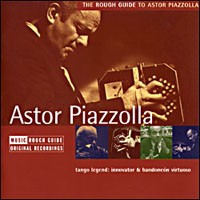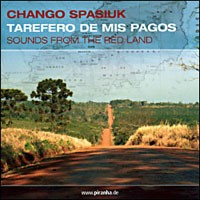|
Astor Piazzolla |
Chango Spasiuk |
Argentina is a huge country, about one-third the size of the United States. So why is it that if an American can identify any Argentinian musician, it will always be Astor Piazzolla? Arguments about American cultural hegemony aside, it really is a little ridiculous that among a country of 37 million people, only one musician stands out. Yet as laughable as such a notion is, one thing is certain: Piazzolla's revolution of the tango was a watershed. His lifelong devotion to and diplomacy for this music of his homeland absolutely earned him the singular stature he has.
This Rough Guide collection does a decent enough job of trying to present an overview of Piazzolla's work, but hamstrung by licensing problems, it comes up a bit short. With the exception of 1957's "Tres Minutos con la Realidad," all of the material here was recorded from the mid-'70s onward, well after Piazzolla's reputation was established. Although a number of older pieces are represented, they are in more recent concert versions. Though far from sterile and undoubtedly thrilling, they present a more refined and thoughtful version of Piazzolla's music. However, it must be said that you'd be hard-pressed to find a more comprehensive representation of his work, given the far-flung nature of his performing career.
For those looking for some Argentinian music beyond Piazzolla (and yes, there is much of it), you could do worse than Chango Spasiuk. Spasiuk is an accordion player whose Ukrainian grandparents settled in a remote northeastern province of Argentina known as Misiones. The music of Misiones – chamamé – is definitely not the tango, certainly not the nuevo tango practiced by Piazzolla. Raucous and earthy, it's the sound of communal drinking and dancing, with brisk rhythms and rapturous melodies. Spasiuk brings a further twist to the folksy sound of chamamé – his Eastern European background (and accordion) pronounces itself in the same way that German polka found its way into Mexican conjunto music. If the improvisational elegance of tango nuevo could be correlated to big band jazz in Argentina's musical spectrum, the rough-and-tumble sound of chamamé is its country blues and Spasiuk is one fine roadhouse player.




















